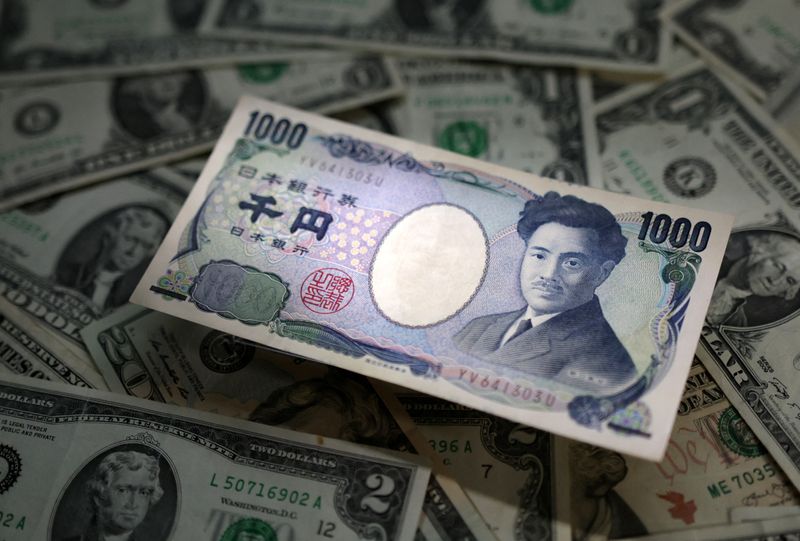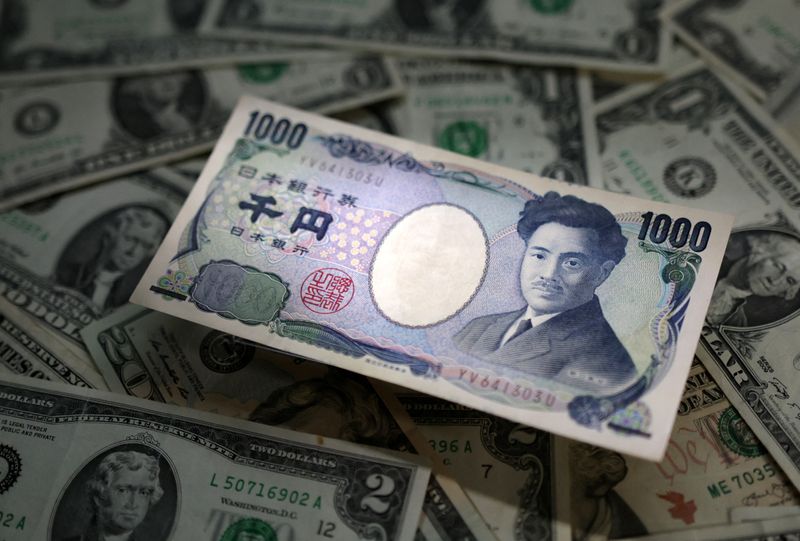
By Stefano Rebaudo
(Reuters) -Investors rushed into safe-haven currencies, including the U.S. dollar, the Swiss franc and the yen, after a warning from Russia over its updated nuclear doctrine.
President Vladimir Putin issued a warning to the United States on Tuesday, lowering the threshold for a nuclear strike after the administration of Joe Biden reportedly allowed Ukraine to fire American-made long-range missiles deep into Russia.
The yen jumped 0.5% versus the dollar and 0.8% against the euro, hitting its highest since Oct. 4 at 161.50.
The yen has fallen about 7% since October and had weakened past the 156 per dollar level for the first time since July last week, putting traders on alert for any intervention from Japanese authorities to shore up the currency.
The Swiss franc was up 0.3% versus the euro at 0.9325 after hitting 0.9305, its highest since early August.
The U.S. dollar index – a measure of the unit’s value relative to a basket of foreign currencies – rose 0.25% to 106.46. It hit 107.07 last week, its highest level since November, 2023.
“Typical risk-off move in forex following the headline,” said Athanasios Vamvakidis, global head of foreign exchange strategy at Bofa, referring to the reaction to the Kremlin statement.
“The market has been complacent on geopolitical risks, focusing on other themes,” he added. “Positioning has been long risk, getting even more stretched after the U.S. elections.”
The greenback has risen more than 2% this month, buoyed by reduced expectations of the extent of Federal Reserve rate cuts and the view that U.S. President-elect Donald Trump will adopt inflationary policies.
The dollar started the European session with a small rise as investors closely watch Trump’s search for a Treasury secretary.
Among the names being considered are Apollo Global Management (NYSE:APO) Chief Executive Marc Rowan and former Federal Reserve Governor Kevin Warsh.
Analysts have been pointing out that Warsh is seen as less protectionist than the other candidates.
The perceived growing likelihood that he might land the job may have been a significant factor in the intra-day Treasury rally on Monday, they say.
TREASURY YIELDS
U.S. Treasury yields edged lower on Monday as traders digested a still-strong U.S. economy and the likely policies of a Trump administration.
“Given the large budget deficit “a candidate that will offer less of a counterweight to some of President-elect Trump’s plans could see the long end of the U.S. Treasury market sell off and perhaps even soften the dollar too,” said Chris Turner, head of foreign exchange strategy at ING.
Markets expect Trump to cut taxes, which could boost the budget deficit.
“The increasing likelihood of former Fed Governor Kevin Warsh as Treasury Secretary is reassuring for market participants as he could help to rein in some of the more disruptive parts of Trump’s policy agenda,” said Lee Hardman, senior currency analyst at MUFG.
Investors are also waiting for the euro area’s negotiated wage figures due on Wednesday and regional purchasing manager surveys on Friday, which could be crucial for the European Central Bank’s policy decision in December.
Markets are fully pricing a 25 basis-point rate cut and a bit less than a 20% chance of a 50 bps move, which, according to some analysts, is still on the table.
On Monday, two top ECB policymakers signalled that they were more worried about the damage that expected new U.S. trade tariffs would do to growth than any impact on inflation.
The euro dropped 0.4% to $1.0553, mostly because of the risk-off move prompted by Putin’s warning. It hit $1.0496 last week, its lowest since early October 2023.

Elsewhere, the Australian dollar last traded at $0.6491.
The Reserve Bank of Australia offered indirect support by reiterating that interest rates were unlikely to be cut soon, and might even have to be raised under some scenarios.
This post is originally published on INVESTING.




